- Register
- Log in to Tune-In
- Wishlist (0)
-
Shopping cart
(0)
You have no items in your shopping cart.
Beatles News

CAPTURING THE WHIMSICAL SPIRIT of one of the world’s great musicians and one of the ’60s best-dressed men, painter John Bratby’s Paul McCartney portraits ooze character, one of them freezing the Beatles tunesmith in mid-whistle, or perhaps even a trademark ‘Ooooooh!’.
Two Macca portraits that Bratby painted in 1967 are reunited for the first time at Hastings’ Jerwood Gallery between January 30 and April 17, 2016, in a show of the late painter’s works entitled John Bratby: Everything But The Kitchen Sink, Including The Kitchen Sink. But a third McCartney by Bratby – this one, presumably – appears to have hunkered down and has so far eluded curators.
Bratby, who died in his adopted home town of Hastings in 1992 whilst walking home from his local fish and chip shop the day after his 64th birthday, was one of the British art scene’s great “radical realists” of the 1950s and ’60s. Celebrities who sat for him included McCartney, Michael Palin, Arthur Askey and Claire Rayner. He is thought to have painted over 3,000 works, and many of the exhibition’s most fascinating items were crowdsourced after an appeal for submissions elicited an a details
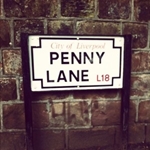
It’s impossible to visit Liverpool and not intertwine your visit with The Beatles somehow. Whether it’s a visit to the museum down on Albert Dock or a pint in Mathew Street’s legendary Cavern Club, the influence of the most influential rock band in history can be seen right throughout the city.
In February of 1967, The Beatles released ‘Penny Lane’ as one half of a double A-sided single, accompanied by ‘Strawberry Fields Forever’. While the former did not top the charts in the UK – nor did the combination continue the band’s four-year stint of continually chart-topping singles – ‘Penny Lane’ remains one of the bands most revered records, and was ranked as the nation’s 6th favourite Beatles track in a recent ITV poll.
The song’s title is eponymous with the street of the same name, and can be found at Smithdown Place, just less than four miles from Liverpool Lime Street.
In an interview with Clash magazine in 2009, Paul McCartney discussed the song’s origin, saying: “’Penny Lane’ was kind of nostalgic, but it was really a place that John and I knew; it was actually a bus terminus. I’d get a bus details

FROM time to time, Scousers like to give themselves a pat on the back (we’re all guilty of it). This set of Merseyside natives however deserve a pat on the back, a round of applause and your last Fruittella.
From war heroes to recording artists, throughout the centuries scousers have lit up the world stage. The banks of the Mersey have produced many men and women of magnitude- individuals that have changed the course of history with their talent, wit and bravery.
Paul McCartney
With sixty gold discs and over one hundred million album sales to his name, Paul McCartney is the most successful recording artist of all-time.
Born in 1942- a resident of Speke- McCartney was a founding member of The Beatles, who would influence a generation of music makers like no other. The list of Beatles firsts is as long as it is remarkable. The first band to occupy the top three places on the American Billboard. The first band to play a sports stadium. The first band to make a concept album. We could go on all day. Paul McCartney was central to the bands pioneering, giving us songs like ‘Yesterday’, ‘Blackbird’ and ‘All My Loving’. A songwriter of the highest order, his body details

There is no better way to while a winter weekend away – unless you count the holes in Albert Hall – than attending the second annual Beatles Weekend this coming Friday and Saturday (Jan. 29 and 30) at the Spire Center for Performing Arts in downtown Plymouth.
Need a little nudge? Well first, it will be nice and warm inside the Spire, and it has a great sound system and a spectacular line up of local favorites, national experts, full-on imitators and talented musicians all paying tribute to the Beatles.
There will also be great food, beer on tap, fascinating memorabilia and a chance to stage your own mini Magical Mystery Tour.
The fun begins Friday evening at 6 with a showing of the world’s first full-length music video, the Beatle’s film “A Hard Day’s Night.”
At 9:30 Friday night the live music starts with Plymouth’s own Fab Four – give or take – 3rd Left! 3rd Left’s Brian Hitchings kicked off last year’s weekend with a unique take on "Blackbird," and this year the band has put together an entire set from the Lennon-McCartney songbook. Diehards can hang on after 3rd Left finishes and watch the extravagant psychedelia of the s details

In an achingly cool canal-side gallery in London’s trendy East End, Tim Baker is showing me his deeply uncool collection of toy soldiers. Or rather, the 1,000 toy soldiers he is arranging on shelves today, which represent a mere twelfth of his total, and still-growing, stash. “These flat ones from the Franco-Prussian war are German, and are still produced today,” the 68-year-old actor tells me. “Those Danish ones you were supposed to make yourself: you bought the moulds and melted down bits of lead pipe. Those French ones were given away in cans of coffee, and you painted them yourself. A lot of these are hand-painted.”
His Beatles collection is probably the most valuable of all those represented at Proud: he bequeathed the original handwritten lyrics of Help, I Wanna Hold Your Hand and Yesterday (“a bit of a fiddle – Paul wrote that out later for me in 1966”) to the British Museum in 1985 when he realised “they were worth more than my house”. Kelle Blyth has some very rare items but just loves the way her multi-coloured, different-headed Pez dispensers look: she doesn’t even like the sweets. Jill Latter started making dolls’ house furniture while c details

Bill Eppridge was sent on a photo assignment for Life Magazine on Feb. 7, 1964. Based on how his editor described the job, Eppridge had no way of knowing it would be one of the most important days of his career.
"Dick Pollard at Life told him 'go the airport, JFK, there's a rock group arriving called The Beatles,'" said Adrienne Aurichio, wife of the late photojournalist. "[Pollard] was not too impressed by them. He said for him to just get pictures of them arriving."
Eppridge, however, was impressed, not just by the four musicians, but also by the mob of fans. They were everywhere: against barricades, on the roof, inside and outside the terminal, most of them young girls, holding banners, reaching out to touch the stars, shrieking for all they were worth.
"He told Dick 'this is kind of interesting, I'd like to stick with it for a few days,'" Aurichio said. "He was more interested in the reaction. He liked to see what people saw in them."
He tagged along on their U.S. journey for six days. That road trip was the basis for a 2014 book, "The Beatles: Six Days that Changed the World," with 148 pictures. That book has been condensed into a 55-item exhibit, which is on view now at Western Connecticut details

The Beatles exemplify the enduring power of pop music — more than half a century old but still playing in headphones everywhere.
In December, the music of the Beatles appeared on streaming sites like Spotify and Apple Music for the first time. In the first three days, Beatles songs were played 70 million times. "They are the standards of the last 50 years," said songwriter and former Barenaked Lady Steven Page.
Page has long been an encyclopedic Beatles fan, and credits the band with greatly influencing his own music. On Thursday, he mounts a tribute to the Beatles, singing the songs of Sgt. Pepper's Lonely Hearts Club Band at the Sony Centre with the Art Of Time Ensemble.
He told Metro Morning host Matt Galloway that the Beatles are a part of life for a lot people, including him. "They were the ones who made me want to make records," he said. He remembered lying on his parents' floor, with his "giant Radio Shack" headphones, getting excited about songs like For No One, off of the album Revolver.
"I remember hearing it as a seven or eight-year-old, and feeling emotionally overwhelmed," he said. Page talked also about the shorter songs on the self-titled album The Beatles, better known as th details
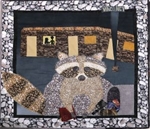
As the opening lyrics to The Beatles’ first truly psychedelic album tell us, “It was twenty years ago today; Sgt. Pepper taught the band to play.”
But it’s been more than 50 years since John, Paul, George and Ringo arrived in the U.S. for the first time, to be photographed descending the steps of a jet to the hysterical greetings of more American fans than they anticipated.
More than 70 million Americans watched the Beatles’ first performance on the Ed Sullivan Show on Feb. 9, 1964. Nearly half the televisions in the country were tuned in. Beatlemania had begun.
That half-century anniversary has been marked by quilters, both nationwide and around the world, in an installation of art quilts on display at the Barns of Rose Hill in Berryville starting Jan. 30.
“Inspired by The Beatles” is a collection of 149 quilts, each illustrating in fabric art the title of a Beatles song.
“It’s really great fun looking through these,” said Elaine Dennison, who organized the show. Each quilt is a 24-inch square. Some are simply stitched and others elaborately decorated with beads, lace and other materials.
By: Maggie Wolff Peterson
< details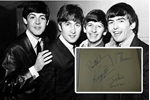
It's not every day you manage to get a celebrity's autograph. And you would think getting autographs belonging to each member of one of the most iconic bands of all time and players from England's only World Cup-winning team would be priceless. But this rare collection of hero signatures is something money can buy, thanks to a Sutton Coldfield woman who gave up her beloved collection of famous names, which sold at auction this week for £1,800.
The autographs of each member of The Beatles from when they performed in Coventry in the 1960s, plus football legends including Bobby Moore and Geoff Hurst, are contained within the precious autograph book which belonged to Jill Darby.
"It sounds very exciting but in fact it was a bit of a cheat because I had an aunt whose name was Marjorie Warden and she worked in the Coventry Hippodrome box office at the time and on this occasion she volunteered to get The Beatles' autographs for me, which is what she did," she explained. The exciting discovery caused quite a stir at Richard Winterton Auctioneers in Lichfield where the star lot went under the hammer on Wednesday (January 20).
Director Richard Winterton said: "You see quite a few autograph books details
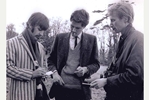
When Beatlemania hit Sevenoaks on a grey winter's day in 1967 – a story which has been well covered by this newspaper – five local girls were given a ringside seat while the filming of the first ever pop video took place in Knole Park.
One of the girls had discovered the best-kept secret of the century. John, Paul, George and Ringo were to film a sequence at a special location in the park to accompany the release of their forthcoming single, Strawberry Fields/Penny Lane.
She told four of her friends who all played truant and searched the park. They came out of the woods into a clearing and there were the Fab Four climbing out of a black Rolls Royce followed, in other cars, by a team of technicians.
The girls were invited to stay, given autographs and made to promise they wouldn't tell their friends. The Chronicle later spoke to the five truants, who wore headscarves so they should not be recognised, and then begged us not to print their surnames. One of them said: "None of us have ever had such a wonderful thing happen, but we should have been at school."
To this day I don't know the names of the five lucky girls who had the Beatles to themselves for the duration of that day's filming details
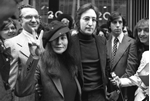
Thirty-five years ago today, an issue of Rolling Stone magazine hit the newsstands featuring John Lennon and Yoko Ono on the cover. That photo, taken by the great Annie Leibovitz, answered for the last time any lingering question anyone might have about the bond between the famous couple.
On the morning of December 8, 1980, Leibovitz arrived at the Dakota, the apartment building west of Central Park where John Lennon and Yoko Ono lived. Although Rolling Stone editor Jann Wenner “never told me what do to” when she went on a photo shoot, Leibovitz has said, this one time he did: “Please get some pictures without her.”
Fortunately, that order was ignored.
Yoko Ono was still considered, among some rock fans, the interloper who had broken up the Beatles. John Lennon didn’t see it that way, of course. He’s never felt about anyone the way he felt about Yoko Ono. “It’s called love,” he told journalist Howard Smith. “It’s a precious gift.”
“I thought it was an abstract thing, you know,” Lennon added. “When I was singing about ‘all you need is love’ I was talking about something I hadn’t experienced. details

Given the ubiquity of The Beatles in popular music, you might think an artist would steer well clear of covering any of their songs.
That's not to take anything away from the biggest band of all time, but the unique stamp they put on every one of their songs makes it hard, when listening to a reimagined version, to think of anything but the usually superior original.
Milos Karadaglic, then, will have to forgive the fact more than a few eyebrows were raised when he announced he was releasing a whole album of Beatles covers.
"I understand any surprise, but I see music as one whole thing - music is music - and I'm not bound by the boundaries of genre," says the 32-year-old. "The Beatles were a perfect subject to take. This is music that has stood the test of time, similar to classical music in that it's been there for as long as we can remember, and its impact is the same as the first time it was played. I've taken something timeless, and brought it into my world, this is why it works."
Milos - like all the best musicians, he only needs to go by his first name - is a classical guitar player, arguably the world's best, born in what's now Montenegro in the former Yugoslavia.
Source: The Shuttl details

Here are some hypothetical scenarios that never actually happen:
You stroll into the gym, iPhone and earbuds in hand, and make your way to a treadmill to get a workout started. You get the treadmill to a nice speed, and you start your run. “Almost forgot!” you think to yourself: “Music!” You take out your iPhone, open Spotify, and play “Yellow Submarine” by the Beatles to get yourself going.
No.
What a night. You and your friends just had the time of your lives and are feeling on top of the world. The night is still young, and the group hops into your car. You can almost feel the vibrant energy in the air. “Hey! Give me that aux cord!” your pals yell. You grant their wish, and everyone braces for a bassline strong enough to barrel roll the vehicle in which they’re sitting. With the entire universe of music at their command, what do your friends play? “Dear Prudence” off of the Beatles’ “White Album.”
Again, no.
It must’ve been such a good idea at the time. The Beatles are the most popular band of all time, and Spotify is now becoming the most popular music service in the world. Why not finally combin details

The effect of Mersey Beat upon popular culture needs no exaggeration. Arguably the first major youth movement in Britain, spawning The Beatles and Rock N’ Roll in the UK, it’s difficult to imagine how music history might have turned out without it. But what got the beat going?
Back then in Liverpool- fifty years before Facebook and Spotify - people had to find out about bands and gigs the old fashioned way. Step forward Mersey Beat Magazine - the unsung hero of a scene that placed Liverpool at the centre of the musical universe.
In 1959, Bill Harry was getting the cash together to fund a jazz publication but, after becoming friendly with a then little known group called The Beatles, he decided to change tack. Harry was a close friend of John Lennon and Stuart Sutcliffe, who - alongside artist Rod Murray - made up The Dissenters (Lennon’s other band who preferred a pint and a rant to playing guitars).
They’d regularly meet in city-centre pub Ye Cracke (where a commemorative blue plaque hangs in their memory) and discuss how they would one day change the world. They did a pretty ‘gear’ job of it.
After numerous failed attempts to get the national press interested details

"I have a bit of an obsessive streak to my personality, and the Beatles are a band that rewards obsessive listening. There are all sorts of little nuggets buried that you didn't hear the first 99 times, but the 100th time, you hear them. By the time I was in college, I was a full-on Beatles completist. I had given myself, like, a Beatles PhD. After college, I applied to teach at Saint Gregory the Great at Ashland and Bryn Mawr in Andersonville. It was basically a charter high school within the archdiocese, and the administration was so incompetent. They had just fired all the teachers and left only one nun, Sister Mary. The yearbook that year had all these bitter messages: "After working here for 25 years and being told I'm no longer capable of using technology . . . "
"Sister Mary was behind the front desk when I handed her my resumé, and she put it on top of the pile because she liked me for some reason, so that's how I got hired. Three weeks before the school year started, we're sitting in this office, me and Sister Mary and two other new teachers, and it was like, "Who's gonna teach American history? How about journalism?" I said, "Well, if you need a Beatles class, I'm your man." She says, "Will you have tim details
